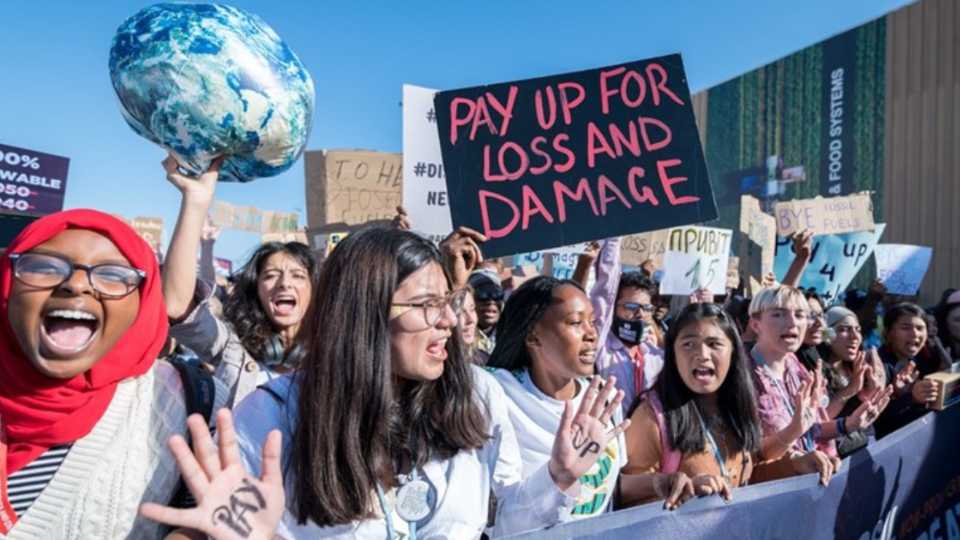
B in the Know: The Routes and Benefits to Becoming a B Corp
March at Future Leap with Alan Bailey
February at Future Leap with Katherine Piper
“Just being 100% renewable in itself was a piece of activism”
Shouting Sustainability from the Rooftops with Molly Byrne
January at Future Leap with Katherine Piper
December at Future Leap with Katherine Piper
Future Leap News: November
Future Leap News: October
September at Future Leap with Keryn Seal
Grant Funding and Debt Finance: Affordability of SME Net Zero Journeys
COP27: What were the key takeaways?
This article is by OggaDoon.
COP27 took place in Sharm El Sheikh in Egypt for more than a week, with 120 world leaders and heads of state in attendance – including a reluctant Rishi Sunak. But with the event billed as a ‘last chance’ to prevent 1.5ºC global warming, what has come from the 12 days of talks, and what progress, if any, has been made on last year’s conference?
1. A ‘groundbreaking’ Loss and Damage deal was struck An agreement was formed right at the last minute of the 2022 COP27 conference, whereby the wealthiest nations committed to supporting poorer nations that are hit the hardest by the impacts of climate change. This Loss and Damage deal will form a fund with money from rich, industrial countries which will be paid out to nations that do very little to nothing to contribute to global warming, yet feel the impacts of the changing climate the most. Our takeaway: This is by far the most positive outcome from the conference, with almost no advancements being made on the topic of fossil fuels or maintaining the 1.5ºC climate goal. Similar deals, like the Paris Agreement, have been largely fruitful when it comes to keeping wealthier nations in line. So we hope this one will go the same way and protect countries that are facing harm while playing almost no role in the changing global climate.
2. 1.5ºC looks unlikely A run on liquified natural gas response to Putin’s war’s effects on global gas supplies is putting the COP26 pledge to work harder at securing the 1.5ºC goal at risk. In fact, with 1.9 billion tonnes of CO2 expected to come from new LNG construction, last year’s 2.4ºC level is looking to remain stagnant, despite nations including Australia having issued new plans aiming to reduce this. Our takeaway: A tricky topic to navigate, while more and more households and businesses are struggling to afford energy bills without increased energy supplies bringing down costs. But surely a more sustainable alternative is worth investing in?
3. The UK’s ‘moral duty’ UK PM, Rishi Sunak, who originally did not want to attend the COP27 talks, took the stage to talk of the UK’s moral duty to act on climate security, as well as energy security. He touched on the UK’s need to invest in more sustainable energy sources, and support developing countries to decarbonise. Our takeaway: Did Rishi just say this for the sake of making an ‘impact’ during his reluctant trip to Egypt? His initial decision to skip the climate talks speaks volumes about his interest in the issue – but this appearance puts him in a good position to be one of the first Prime Ministers to really make an impact on the world stage when it comes to our small nation’s big impact on the environment.
4. Corporations called out for greenwashing A group of 17 UN experts spoke out about ‘greenwashing’ by large corporations. In a report released at COP27, they highlighted the fact that net zero targets are not possible while corporations still invest in fossil fuels, and that those who do so should not be taken seriously in their climate pledges. Our takeaway: We’ve said it before and we’ll say it again: greenwashing gets you nowhere. For years, individuals have been calling out brands for pretending to be environmentally friendly while their actions say otherwise. Now, we’re finally seeing this call-out take place on a global platform. Hopefully the world will take notice.
5. China and USA called to deepen pact Last year, the USA and China – two of the world’s largest polluters who famously disagree on almost all political issues – formed a pact to fight their climate impact together. This year, UN leaders have said that if the two nations do not work harder to cut their emissions, and if the world’s richest countries do not financially support poorer nations to reduce their carbon footprints, then they are signing a ‘collective suicide pact’.
Our takeaway: the pact between the USA and China seems like a perfect example of how easy it is for leaders to sign a pledge at COP and then forget about it the moment they’re on their private jet home. But if these two carbon-emitting giants don’t take action, the climate crisis could be on their heads. 6. The Sharm el-Sheikh Adaptation Agenda Sameh Shoukry, President of COP27, announced The Sharm el-Sheikh Adaptation Agenda: a plan that will help guide nations through necessary adaptations to the impact of climate change. This includes updating agricultural methods, investing in reforestation, providing energy access to those currently without, and halving global food waste. However, a report titled 10 New Insights in Climate Science, commissioned by Future Earth, the Earth League and the World Climate Research Programme for the United Nations summit, has stated that consistent ‘adaptations’ to the climate crisis are a myth that cannot be sustained. Our takeaway: the purpose of this plan is to help countries understand what they can do to slow and even prevent the impact of climate change, which is set to affect almost 50% of the world’s population by 2030. Halving food waste, investing in forests, and updating infrastructure to ensure efficiency all seem like a good place to start… as long as it’s not forgotten before COP28 comes around.

